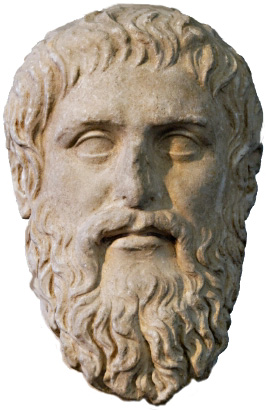...Best of Sicily presents... Best of Sicily Magazine. ... Dedicated to Sicilian art, culture, history, people, places and all things Sicilian. |
by Vincenzo Salerno | |||
Magazine Index Best of Sicily Arts & Culture Fashion Food & Wine History & Society About Us Travel Faqs Contact Map of Sicily
|
It would take volumes to even scratch the surface to reveal - and perhaps understand - much of Plato's philosophy. In the Sicilian sphere, it is interesting that he spent time in Syracuse, and considered ancient Sicily the best setting for his idealized Utopia. He had also been to Egypt and peninsular Italy. Plato lived in Syracuse during at least three distinct periods. According to Diogenes Laertius, considered a reliable source, Plato first visited Syracuse while it was under the rule of the tyrant Dionysus I. During this first trip Dionysus's brother-in-law, Dion, became one of Plato's disciples, but the tyrant himself turned against Plato. Such were the complexities of life in a Greek city. Following Dionysus's death, according to Plato's Seventh Letter, Dion requested that Plato return to Syracuse to tutor his nephew Dionysus II, and guide the boy to become a philosopher-king - a concept widely credited to Plato. Dionysius II seemed to accept Plato's wise teachings, but the great philosopher became suspicious of Dion (the young man's uncle). Dionysus II soon expelled Dion and kept Plato against his will. Plato eventually left Syracuse. Dion would return to overthrow Dionysus II and ruled Syracuse for a short time before being usurped by Calippus, a fellow student of Plato. A substantial part of the Republic describes how the ideal educational system should be set up to foster the development of philosopher-kings such as Dionysus II. Scholars debate the precise relationship between Plato and Socrates (470-399 BC). In his Apology of Socrates, Plato describes himself as a young follower. In turn, Aristotle (384-322 BC), who laid a foundation for the study of ethics, studied with Plato. The three - Socrates, Plato and Aristotle - are considered the greatest philosophers of antiquity. However, it is to Plato specifically that historians credit the early growth of philosophy as a distinct discipline and science, and his dialogues were a very pragmatic approach to the presentation and expression of organized thought, even if Aristotle may have been more thorough or scholarly. Significantly, Greek philosophers built upon what came before their own births; an earlier philosopher praised by Plato and Aristotle was Empedocles of Akragas (now Agrigento). Though ancient Greek philosophy was in some ways eclipsed by subsequent movements, perhaps most obviously by Christianity (shaped largely by the writings of Paul, who also visited Syracuse), it eventually merged with other patterns of thought to form the basis of "Western Philosophy" generally, and its influence on the various sciences cannot be overlooked. That Syracuse attracted so great a talent says much about that city, which in its golden age was secondary in importance only to Athens among Greek cities. Sadly, Sicily never became quite the Utopia that Plato envisaged but it did, in a later age, enjoy the rule of two philosopher-kings, Roger II and his grandson Frederick II. About the Author: Palermo native Vincenzo Salerno has written biographies of several famous Sicilians, including Frederick II and Giuseppe di Lampedusa. | ||
Top of Page |
 Plato was born in what is now Greece, probably
in Athens, around 427 BC (BCE), and died around 348. In his eighty years
he achieved a great deal, and influenced the thought of Homer, Aristophanes,
Aesop, Pythagoras and others. In the Roman world, Saint Augustine, Cicero
and Plutarch were influenced by Plato's ideas. Platonism and Platonic
Realism remain hallmarks of his philosophy, while his Republic
forms an important part of Classical learning. Platon was most probably
the nickname of a certain Aristocles, but we'll never know for certain.
Plato was born in what is now Greece, probably
in Athens, around 427 BC (BCE), and died around 348. In his eighty years
he achieved a great deal, and influenced the thought of Homer, Aristophanes,
Aesop, Pythagoras and others. In the Roman world, Saint Augustine, Cicero
and Plutarch were influenced by Plato's ideas. Platonism and Platonic
Realism remain hallmarks of his philosophy, while his Republic
forms an important part of Classical learning. Platon was most probably
the nickname of a certain Aristocles, but we'll never know for certain.